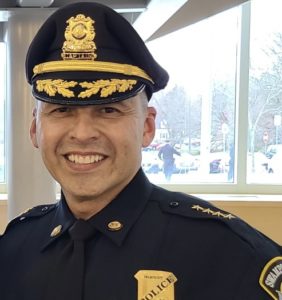Blog Post: Q&A with Chief Ruben Quesada
July 28, 2022
Law Enforcement Immigration Task Force Blog
Q&A with Chief Ruben Quesada
Chief Ruben Quesada is the Police Chief of the Swampscott, Massachusetts Police Department. Prior to becoming Chief, he served in the Mesa, Arizona Police Department for more than two decades. Chief Quesada holds a Doctor of Education from Grand Canyon University, where he completed his dissertation: “Shades of Brown and Blue: Understanding Latino Police Officers.” In a Q&A with Chief Quesada, we dive further into his research on Latino police officers and how it relates to police engagement with immigrant communities.

Why did you pursue a Doctor of Education? How has it impacted your role as a law enforcement officer and Chief?
It was while I was with the Mesa Arizona Police Department that I decided to pursue my Doctor of Education, to be competitive with so many highly driven and talented individuals. It was at that time that I fell in love with police research. It was my way of combining two of my passions- education and law enforcement. Having attained my EdD and being published has given me the opportunity to review the literature and think critically about the law enforcement profession, question past practices, and look at ways of moving the profession forward through data, research, and personal experiences. The heart of our profession is about understanding people. It is important in my role as a Police Chief to understand people from all ethnicities, languages, gender identities, religions and regions. While I may no longer work in a community that has a substantial population of Hispanics, our surrounding communities around Boston are heavily populated with a large percentage of Spanish-speaking individuals. It is imperative in my role as a Police Chief that I continue to protect all members of the communities that we serve.
In your dissertation, you talk about a feeling of conflict between being a Latino and being a police officer. How did you find that these identities intersected for the officers you interviewed?
The officers in my research relayed the conflict they experienced as Arizona police officers. Much of this conflict stemmed from the 2010 Arizona Senate Bill 1070, which made being in the country illegally a state crime. Police in Arizona were allowed to detain anyone suspected of being in the country illegally and require immigration status checks during law enforcement stops. This was one of the most restrictive immigration laws ever enacted.
In conducting my research, twelve of the fifteen officers reported that their professional and ethnic self-identities intersected when their status as a Latino or status as a police officer was in discord. The intersection of identities occurred when they faced an internal contradiction or conflict in their views as a Latino versus their views as a police officer. One of my participants best described the immigration enforcement as, “It’s my duty, but it certainly would have conflicted with what my heart felt about, you know, what they contribute.” They also described that police officers are often granted the authority to use discretion, but in this case it was taken away. Many of these officers felt that they were forced to pick a side. One officer begrudgingly expressed, “police first, Latino second.” These officers fully understood they represented dual identities and described the benefits and challenges that arose from navigating between the two. They reported the belief of having to balance the sometimes-competing demands to select allegiance or loyalty of one identifier over the other. Ten of the fifteen officers felt conflicted, or “stuck in the middle,” while four officers had very strong views against immigration enforcement.
While this conflict was internal to these officers, many officers in the Phoenix Metropolitan area were also conflicted. This led to immigration enforcement debates between local law enforcement and our then Maricopa County Sheriff who conducted immigration raids.
You also talk about Latino officers feeling they could further assist people who spoke Spanish because of their shared language or culture. What is the importance of that kind of connection and how does it relate to community trust?
The use of the Spanish language placed the officers in a position where they felt they could meet the needs of the Latino/Hispanic community. These officers believed their identity as a Latino created a connection with Spanish speaking individuals because of their shared ethnicity, culture and language, more so than a non-Spanish speaking police officer could create. This intraethnic connectedness has been well-documented in the research in that ethnic minority police officers will exhibit feelings of solidarity with individuals who share the same ethnicity.
In my findings, fourteen of the fifteen officers believed they felt both appreciated and needed by the Spanish speaking community. They felt valued by Spanish speaking individuals and believed they shared communal values that were passed down to them by their family members and elders in their own upbringing. These officers expressed a profound desire to serve and be a representative to the community. One of the officers said it best, “…based on the fact that I do speak that language, I do resemble that neighborhood. You know? I resemble the people that I serve.” This connection that these officers felt is well documented in the literature. The shared connection coupled with their cultural competencies often facilitated these marginalized communities to be heard, respected, and have a voice. This led to greater trust between the police and the immigrant community.
What are the broader implications of these findings for police engagement with immigrant communities?
Officers believed their own experiences and struggles in terms of racism and disparate treatment allowed them to better understand individuals from various backgrounds and diversity. They believed this shaped them to become better police officers. They understood the need to appreciate differing perspectives even when their own personal contradicting beliefs existed. One of the officers said, “Your identity helps you be sensitive to that and hopefully it crosses all realms and understand that we have a bad habit of seeing and making, our judgements based upon the color of the glasses that have shaded us.”
The broader implications are that we as a profession need to better socialize our academy recruits to collaborate and learn from immigrant communities. That socialization and collaboration must continue through an officer’s 20-30 year career.
Are there any other ways that your research has impacted your policing philosophy, especially as it relates to working with immigrant communities?
If anything, my research has strengthened my resolve to continue to partner, collaborate, and ensure that our efforts with of our immigrant communities are never complete. We must safeguard the often-unheard voices of our immigrant communities. We must emphasize they are given an ability to be heard, understood, valued, and respected. We must create a path for future civic engagement, increase resource availability for immigrant victims of violence, decrease anti-immigrant sentiment, and increase the underreporting of criminal activity due to language barriers. When I accomplish these goals, then I will know it is time to retire. In the meantime, there is work to be done.



